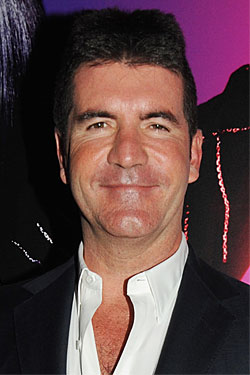
Onscreen, Simon Cowell is not known for gambling. On American Idol, his judgments are cold, unsentimental, and usually correct ÔÇö and theyÔÇÖre what made him a star. So heÔÇÖs no doubt confident that he made the right move by deciding to leave Idol at the end of this season in order to bring his own hit U.K. show, The X Factor, to America. In Britain, the same jump worked: The U.K.ÔÇÖs Pop Idol, for which Cowell originally judged but did not own, was forgotten after two seasons, while X Factor, his own singing-competition creation, has dominated the fall schedule for the last six years. But here Idol is far more entrenched. Will viewers follow Cowell to the new show? Who makes a reality-TV show, the judge or the format? Idol has shrugged off Paula AbdulÔÇÖs departure; ratings for its season-nine premiere rivaled last yearÔÇÖs. That might give Cowell pause, but if you compare the two showsÔÇÖ formats, The X Factor seems like ÔÇö once again ÔÇö a good judgment call.
Under its familiar surface ÔÇö themed weeks, judging panels, phone vote ÔÇö The X Factor shifts power from voters to judges. Cowell and company will play a far more important role in the new show, with greater say over who performs, what they perform, and what their fate is. The most obvious change is in who takes part. Idol has showcased AmericaÔÇÖs shiniest young talent, but The X Factor casts its net wider to take in older singers and groups. That immediately broadens the range of stories the show tells: BritainÔÇÖs first winner was a 35-year-old pub singer. It wonÔÇÖt hurt The X FactorÔÇÖs quality, either; in a country with AmericaÔÇÖs traditions of harmony singing, the introduction of vocal groups is a sure winner.
Where the judges start to really matter is in the ÔÇ£mentorÔÇØ system. X Factor contestants are funneled into categories (boys, girls, over-25s, and groups), and each judge takes responsibility for one. That judge chooses the finalists, guides them, picks their songs, and advocates for them in the live shows. The upshot is an entire second layer of competition among the judges, which Cowell naturally revels in. Should a mentor lose all their contestants before the series ends, they hang on as an embittered kingmaker, generally more honest about the performances. It all makes X Factor arguments spicier, with song choices in particular coming in for fierce criticism.
The final difference is in the voting: On The X Factor, the public vote determines the bottom two contestants each week, who have to sing again for their futures. This time the judges decide, at least until the closing weeks. It can put the brakes on the publicÔÇÖs wilder whims, but it also makes for desperate, compelling performances as finalists fight to stay in the show.
All these changes helped solve a particular problem in the U.K. The X Factor may have discovered Leona Lewis, but BritainÔÇÖs talent pool is naturally small. The bells and whistles attached to the X Factor format helped disguise this by focusing more on the judges. It means a seasonÔÇÖs worth of infighting, which holds viewersÔÇÖ interest even when there are weak finalists. But should the American version find singers as good as Idol has unearthed, thereÔÇÖs a chance The X FactorÔÇÖs extra layers will become an annoying distraction from the music.
Much depends on CowellÔÇÖs choice of fellow judges. In Britain, he initially faced the formidable Sharon Osbourne, spikily protective of her acts and forthright on the failings of others. HeÔÇÖll need a similarly inspired pick to produce the chemistry The X Factor needs. If he decides to reinstate Paula Abdul, the mentor format may force her to be more opinionated (she can no longer act as doting mother hen to all contestants), though the high-pressure sing-offs for survival mean there is a role for kindlier figures, too. He might also tweak the format further: Given that the show is structured around warring camps, why not divide performers by style rather than age, giving one judge country, another pop, and a third R&B?
CowellÔÇÖs thick skin and Svengali instincts should ensure the American X Factor is a success. And one thing is certain: He will happily play the villain, but always a savvy one. In Britain he rides a tide of X Factor backlash each year: This Christmas, two Facebook users organized a protest which resulted in Rage Against the MachineÔÇÖs ÔÇ£Killing in the NameÔÇØ hitting No. 1 on Christmas ahead of the X Factor winner, who historically nabs that spot. CowellÔÇÖs reaction? Call the pair up and offer them a job.

